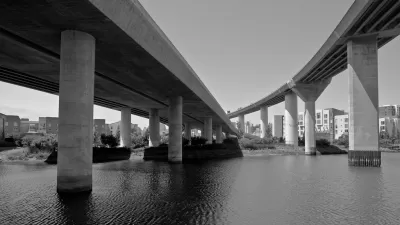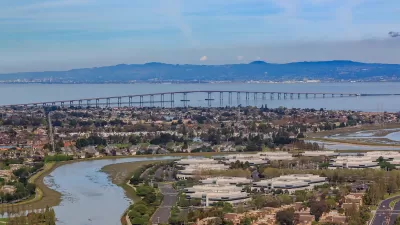The county agency that had hoped to do downtown cordon pricing now wants to add express lanes on Highways 101 and 280, but city supervisors are divided on charging solo drivers the option to buy into managed lanes. Both freeways lack carpool lanes.

"The notion of charging drivers to use an express lane met heat from from the supervisors, who earlier this month voted against funding $4 million to study express lanes in the next phase of the study," reports Joe Fitzgerald Rodriguez, who covers transportation for the San Francisco Examiner, on December 27.
At the Dec. 5 meeting of the San Francisco County Transportation Authority, the supervisors, acting in their capacity as the Board of Commissioners, "voted 5-4 in favor of funding the study, but with the absence of two supervisors were unable to garner the necessary six-vote majority," adds Rodriguez. The chair, Supervisor Aaron Peskin, is a supporter of the study.
The project, dubbed the 'U.S. 101/I-280 Managed Lanes Project, consist of three sections totaling 5.9 miles, with a notable 4.1-mile gap. See map (png). [Click again to enlarge.]
The critics on the board said I-280 should not be the focus of an express lane study, and said it does not address downtown traffic congestion.
“I would offer that downtown is moving toward 280 at a rapid clip,” Peskin rebuffed, arguing that downtown traffic is already there, and must be managed soon."
The north end of I-280 is adjacent to booming Mission Bay, where the Golden State Warriors NBA arena is under construction.
To the critics' point, the authority did propose cordon pricing for downtown in 2010, somewhat similar to New York City's proposal that died in 2008 and now is being reborn with support from Gov. Andrew Cuomo.
Rather ironically, the San Francisco cordon pricing plan was dealt a major setback due to opposition from the city's southern neighbor, San Mateo County, for tolling the same two freeways, although all motorists would have had to pay, not just those in express lanes, illustrating the difference between toll lanes and toll roads.
San Mateo is now partnering with Caltrans in proposing express lanes on Highway 101, dubbed the SM 101 - Managed Lanes Project (MLP) from Redwood City to San Bruno. It is currently working through the environmental review process.
"Tilly Chang, executive director of the transportation authority, told the Examiner if the project was enacted, some portions of the highways would see some existing lanes repurposed to be express lanes, as well as new lanes created on the shoulder of the freeway," adds Rodriguez.
Andrew Heidel, senior transportation planner for the authority, indicated that "[a]ny funding garnered would likely be used to pay for transportation, bicycle and other road improvements aimed at easing traffic congestion."
FULL STORY: SF considers paid express lanes on highways to ease traffic congestion

Study: Maui’s Plan to Convert Vacation Rentals to Long-Term Housing Could Cause Nearly $1 Billion Economic Loss
The plan would reduce visitor accommodation by 25,% resulting in 1,900 jobs lost.

North Texas Transit Leaders Tout Benefits of TOD for Growing Region
At a summit focused on transit-oriented development, policymakers discussed how North Texas’ expanded light rail system can serve as a tool for economic growth.

Using Old Oil and Gas Wells for Green Energy Storage
Penn State researchers have found that repurposing abandoned oil and gas wells for geothermal-assisted compressed-air energy storage can boost efficiency, reduce environmental risks, and support clean energy and job transitions.

Private Donations Propel Early Restoration of Palisades Playground
Los Angeles has secured over $1.3 million in private funding to restore the Pacific Palisades playground months ahead of schedule, creating a modern, accessible space that supports community healing after recent wildfires.

From Blight to Benefit: Early Results From California’s Equitable Cleanup Program
The Equitable Community Revitalization Grant (ECRG) program is reshaping brownfield redevelopment by prioritizing projects in low-income and environmental justice communities, emphasizing equity, transparency, and community benefits.

Planting Relief: Tackling Las Vegas Heat One Tree at a Time
Nevada Plants, a Las Vegas-based nonprofit, is combating the city’s extreme urban heat by giving away trees to residents in underserved neighborhoods, promoting shade, sustainability, and community health.
Urban Design for Planners 1: Software Tools
This six-course series explores essential urban design concepts using open source software and equips planners with the tools they need to participate fully in the urban design process.
Planning for Universal Design
Learn the tools for implementing Universal Design in planning regulations.
Ascent Environmental
Borough of Carlisle
Institute for Housing and Urban Development Studies (IHS)
City of Grandview
Harvard GSD Executive Education
Toledo-Lucas County Plan Commissions
Salt Lake City
NYU Wagner Graduate School of Public Service





























